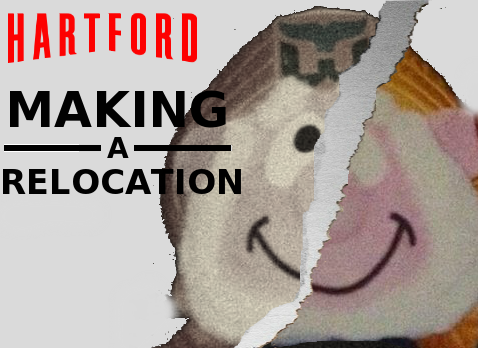
“Making A Relocation” is an ongoing series exploring the inconsistencies between the facts and the public narrative surrounding the demise of the Hartford Whalers. If you’re new to the series, we recommend that you start at the beginning:
- PART ONE: Who Killed the Whale?
- PART TWO: The Things That We Lost
- PART THREE: Four Years in the Wilderness

Gordon taking the “Ice bucket challenge” while wearing a Whalers shirt in 2014.
So we have our smoking gun, or harpoon as it were. When Richard Gordon sold the Whalers to Peter Karmanos of Compuware, it was known that Karmanos and his ownership group were looking for a team to relocate. I don’t think there’s any reasonable argument to be made that Richard Gordon didn’t sell the team with full knowledge that it would be moved out of Hartford as a result. I think we can say when and how it happened. What is harder to say is why.
I was surprised at how the task of making sense of Richard Gordon’s motive came to consume the telling of this story. Twenty years later the conversation about the Whalers departure (when we aren’t blaming the fans) is really about Peter Karmanos and his betrayal. But the deeper I dig into this thing, the more old Ponytail Pete seems like nothing but a footnote. The deed was done years before Karmanos blew into town. The team was dead, gutted and trussed up, just waiting for someone, anyone, to come pick up the corpse and drag it south.
But as sure as I am of that, I am equally certain that Richard Gordon bought the Whalers with noble intent. He was a Hartford guy with Hartford roots. He believed in downtown, he loved the Whalers and I think saw himself as the steward of that tradition. As contradictory as that may seem, it really makes some sense out of the oft-indiscernible chaos that followed. Gordon sabotaged the team, with increasing deliberation as time went on, yet he fended off attempts to relocate the team to nearly half a dozen cities as Miami, Las Vegas, Minneapolis, Dallas, Anaheim all circled like vultures.

Gordon held on while Carrie Saxon Perry, the infamous socialist mayor of Hartford, colloquially known as the Hat Lady, refused to renegotiate the brutal lease the Whalers had with the city-owned Civic Center. In a time when concession revenues were becoming a major piece of how NHL teams turned a profit, Saxon Perry refused to budge an inch. She publicly questioned whether the departure of the Whalers would be a good thing for Hartford, making comments to the effect that “hockey is for white people”. It’s hard to fault Gordon for leveraging those relocation threats for help from the state when his pleas fell on deaf ears at city hall. Hell, even Aetna, who had formerly owned and help build the Whalers, was threatening to relocate, famously claiming that it was “us or Saxon Perry” if she won another term as mayor.
I could probably go back and forth forever, were it not for gem I stumbled upon: a 2004 interview of Richard Gordon by ESPN’s John Buccigross in which he spells it all out in absolute clarity.
Asked if he thought professional hockey could ever work again in Hartford, he said nothing about the recession or poor decisions. Gordon had a single-minded focus on the ascendence of the NHLPA and rising player’s salaries:
“Only on a subsidized basis and if you knew what your costs were…Hockey has no control of its costs because costs are players’ salaries. Goodenow says no one is putting a gun to the owners’ heads to pay these salaries. Arbitration is an automatic gun. That’s the thing that destroys the league as far as I can see.”
Most helpfully for me, the fool who has taken on the maddening task of discerning the truth from twenty year-old public relations spin, was Gordon’s uncharacteristically blunt and direct answer to the question of when he gave and decided to sell the Whalers:
“I bought them because the league was stabilized, I like hockey, and I had an investment in downtown Hartford. There was a commonality of interest between players and owners. I sold them when I met (head of the NHL Player Association) Bob Goodenow. I was convinced he would destroy the league.”
When exactly did Gordon meet Bob Goodenow? According to this article by Jeff Jacobs, they met all the way back in 1990. Way back in the Ed Johnston days, before the disastrous Ron Francis trade. You can see Gordon setting the stage for the inevitable sabotage all the way back then, publicly refusing in advance to pay the $700,000 it was expected to cost to re-sign Francis, even as it became abundantly clear that a new day had dawned in the NHLPA and players of similar caliber were making $1 million or better.
Consider for a moment the irony that the Whalers, the flagship franchise of the World Hockey Association that famously battled the NHL reserve clause and single-handedly gave players the bargaining power needed to drive up salaries, was being destroyed by an owner fighting a losing battle against the player’s association.
Consider also what it means that Gordon was fighting this battle back in 1990.
He knew.
All the way back then, in 1990, he knew.
Everything that followed, from Ron Francis to Peter Karmanos, was premeditated. Before we’d had a single year of bad attendance, the deal was done, and nothing we did mattered one way or the other. Of course, it didn’t help that we played right into their hands by showing our frustration with empty seats. It gave them a pretense for the treachery that followed. That said, it mattered little that we rallied the filled the seats. Attendance climbed against all odds after the departure of Gordon, and as soon as Karmanos made a credible threat of relocation we packed the house. They made it harder and harder to buy tickets, but instead of shrinking the season ticket base grew by 3000. As everyone knows, this didn’t result in saving the team. Karmanos instead opted to depart early, only three years into the meager four he’d promised. It infuriated us and still does, in no small part because it made no sense.
If I’ve accomplished nothing else here, I feel like I’ve made some sense of that. It doesn’t turn back time or make things right, but at least I understand now. Karmanos didn’t keep the team here because he couldn’t. He was reading from a script that someone else had started writing years ago. When things go dicey it was because the fans didn’t do their part. We were supposed to stay away, let the Whalers limp off into the sunset with a shrug. We didn’t. He didn’t know how to respond to that, having written Hartford off years before arriving.
The real issue, a new arena and the attendant revenue streams, became the focus as the Whalers resumed selling out every game. Gordon was gone, the seats were full, and Hartford was within striking distance of forcing Karmano’s hand and keeping the team in Hartford. If Gordon had acted alone and the state had done the right thing, there was a real chance that things could have been made right even after all those bad years and bad decisions.
Twenty years later, it comes as no surprise that obvious solutions are easier said than implemented.

In the next installment: The governors who made Gordon’s betrayal possible, the “Save the Whale” campaign that wasn’t supposed to work, and the sad ending you already know.

Another sad chapter in the saga of Hartford–once a thriving, beautiful and historic capital city. I’ve been fortunate to support the Hartford Ballet, Hartford Stage, Hartford Symphony–all gone or struggling in some ways to survive.
Being an enthusiastic Whalers’ season ticket holder of many years standing, I still don’t really ‘get it’.
Hartford seems to love shooting itself in the foot. How very sad.
LikeLike
Still figuring it out myself, which is probably why I felt the need to write this. Loving Hartford means having a broken heart.
LikeLike
Pingback: MAKING A RELOCATION, PART FIVE: The Hartford Patriots | exile on trumbull street
Pingback: MAKING A RELOCATION, PART SIX: Dirty Deeds (Done for $45 Million) | exile on trumbull street
Pingback: MAKING A RELOCATION, PART SEVEN: Dead Whale Walking | exile on trumbull street
Pingback: MAKING A RELOCATION, PART EIGHT: Requiem For a Pipe Dream | exile on trumbull street
Pingback: MAKING A RELOCATION: The True, Untold Story of How Hartford Lost the Whalers | exile on trumbull street